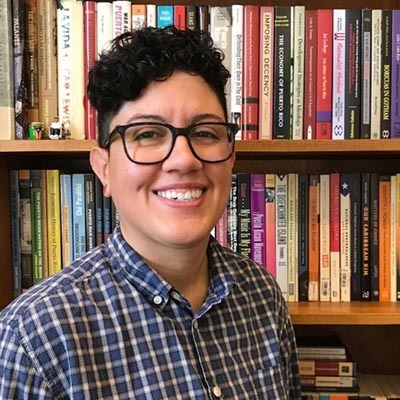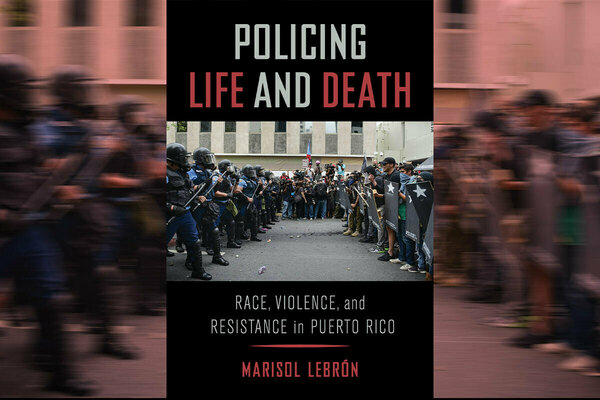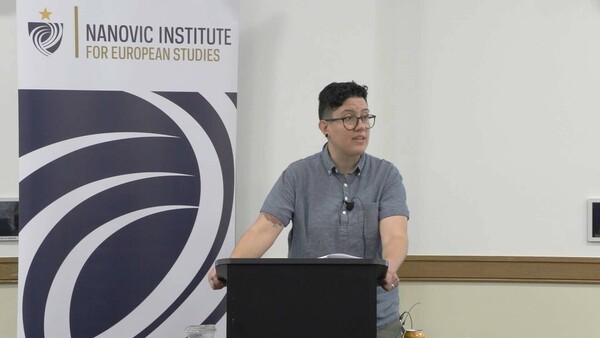Marisol LeBrón is an associate professor in feminist studies and critical race and ethnic studies at the University of California, Santa Cruz. An interdisciplinary scholar, her research and teaching focus on social inequality, policing, violence, and protest. She is the author of Policing Life and Death: Race, Violence, and Resistance in Puerto Rico (University of California Press, 2019) and Against Muerto Rico: Lessons from the Verano Boricua (Editora Educacion Emergente, 2021). LeBrón presented the fourth of a series of lectures on "Decolonizing Scholarship." Hosted by the Nanovic Institute for European Studies, this series features scholars from various academic disciplines at the top of their fields and will run through the fall 2023 semester.
Lora Jury, a 4th-year Ph.D. candidate in Italian studies with a double minor in gender studies and film, television, and theatre at the University of Notre Dame, has written a summary of LeBrón’s lecture, which may also be viewed in full on the Nanovic Institute’s YouTube channel.

On April 14, 2023, Professor Marisol LeBrón delivered the final lecture of the spring 2023 semester for the Nanovic Institute’s “Decolonizing Scholarship” series. LeBrón’s four-part analysis examined the ways in which the Puerto Rican people, particularly feminist groups, responded to the federal imposition of a Fiscal Control Board in 2016 and the impact of this financial encumbrance in the wake of Hurricane Irma (Aug 30, 2017 – Sep 12, 2017) and Hurricane Maria (Sep 16, 2017 – Oct 2, 2017). LeBrón’s presentation provided a toolkit for those engaged in the work of feminist and decolonial activism, as well as frank insight into the potential for oppressive consequences for those who oppose government policy.
As LeBrón explained during her presentation, a large part of her scholarship to date resides in the collective curation of educational resources, such as the Puerto Rico Syllabus, for learning about the debt crises in Puerto Rico and the obfuscation of information about how the territory’s debt was formed. For LeBrón, there is power and empowerment in the demystification of financial language and international economic policy.
“The realm of the affective”
In the first section of her presentation, LeBrón proposed the notion of “the affective” as an alternative to economic and political indicators that ineffectively capture the experiences of Puerto Ricans in the archipelago and in the Puerto Rican diaspora. She foregrounded this notion with the story of a people, who, after a decade of fiscal collapse, experienced the devastation of two consecutive category 5 hurricanes. The aftermath of these disasters was amplified by the weakening of vital infrastructure on the island — a direct result of the precarious economic conditions dictated by colonialism.
According to LeBrón, after the hurricanes devastated Puerto Rico’s infrastructure, caused thousands of untimely deaths, and pushed many more to migrate, its people’s “affective tenor” was expressed in terms of their devastation. They used terms such as “fear,” “hopelessness,” “exhaustion,” “numbness,” “anger,” “resignation,” “abandonment,” “isolation,” and “depression.” The ordeal of surviving the hurricanes forced the Puerto Rican people into a state of “affective reckoning with the kinds of structural violence that they had been enduring for decades.”
Puerto Ricans didn’t need to “get over” their negative affect, nor did they need to demonstrate an impossible aptitude for overcoming the mass tragedy and death wrought by the hurricane. Instead, the potential for change was in the propensity for coraje: courage, anger, and rage.
When Puerto Ricans expressed these feelings via social media, their posts were often characterized by “negative affect.” Instead of focusing on collective change and governmental responsibility to remedy the issues caused by the hurricanes, and to prevent such outcomes in the future, social media offered hollow words of reassurance that focused on the necessary determination of the individual to overcome the current tragedy. Slogans such as “Puerto Rico se levanta” (Puerto Rico rises) and “Puerto Rico strong” shifted the focus to the image of the Puerto Rican who innovates their way out of the tragedies exacerbated by their homeland’s chronic debt. There were many more people who, with their expressions of “negative affect,” rejected this impetus for forced optimism. For LeBrón, this was the most appropriate response to the pressing circumstances facing Puerto Ricans. These circumstances, and the “affective conditions” they produced, occurred not because of individual action but as the direct result of “structural relations of domination, such as colonialism and racial capitalism.”
In contrast, the realm of the affective is a generative rather than a stunted force. Puerto Ricans didn’t need to “get over” their negative affect, nor did they need to demonstrate an impossible aptitude for overcoming the mass tragedy and death wrought by the hurricane. Instead, the potential for change was in the propensity for coraje: courage, anger, and rage.
“Coraje is a political emotion”
The heart of LeBrón’s presentation ("heart" being the English word for the Latin root of “coraje”) was that coraje has emerged as "one of the most potent responses to the ongoing crisis of colonial capitalism in Puerto Rico [...] it is an essential political emotion necessary for structural transformation.” Where Frantz Fanon conceived of rage as an impediment to change that needs to be managed and overcome, feminist theorists (led by Black and indigenous women) have recuperated the emotion. For them, rage functions instead as “an optic that reveals existing harm and foregrounds justice and healing.”
Black and indigenous feminist scholars have shown that rage helps rather than hurts because persisting in the face of massive adversity, “maintaining a brave face,” does not permit the individual or the community to express the full extent of the injustices of structural colonial violence. Anger is instead characterized by its transformative potentials; it is a rejection of the repression of rage, on part of the colonial discourse that white supremacy has forced on Black and indigenous people in the Americas; it is a desire to upend and destroy the systems that generate this rage.

To demonstrate an example of coraje among feminist and decolonial activists, LeBrón’s analysis drew upon the events of the 2017 May Day protests in San Juan, following the imposition of a U.S. federal control board. Implemented by President Obama under the PROMESA (Puerto Rico Oversight, Management, and Economic Stability Act) bill, the control board had the intention of addressing the fiscal crisis in Puerto Rico. Around 100,000 people marched in San Juan’s financial district, the Milla de Oro, demanding an inquiry into the PROMESA bill, which they felt ensured U.S. profits at the expense of the poorest and most vulnerable Puerto Rican citizens. Before long, the protestors encountered “walls of police in riot gear,” who “initiated a series of violent confrontations when protestors began to break the windows of financial institutions and spray paint messages on their walls.” Many people were injured during these confrontations, and those who attempted to flee were chased down and arrested.
Nina Droz, an occasional model, and well-known figure in Puerto Rico’s punk scene, was arrested and accused of representing a particularly menacing threat. She was characterized in the popular press as “The Girl Who Breathes Fire” to cement a pernicious idea of her in the public imagination as “simultaneously seductive and destructive.” Droz was made into an example of what happens to those who challenge the hegemonic discourse around Puerto Rico’s debt crises and their links to colonial state violence. She was among twenty people arrested that day, but she was the only individual charged with federal crimes that carried a heavy minimum sentence. Consequently, she was found guilty and sent to prison for 37 months in Tallahassee, Florida (an attempt to distance her from her supporter base and to control her sense of “coraje”). During the criminal proceedings and her time in prison, Droz was denied bail, subjected to sexual and physical violence, denied healthcare, and exposed to harassment, abuse, and arbitrary punishment by state operatives, all because she had exercised her right to protest.
Droz’s case represents the consequences that women potentially face because of activism that opposes the colonial state. But for her, coraje was a means of survival. It served as a refusal of the grinding punishment of colonial violence in all its forms and a drive to confront those destructive entities that dominate Puerto Rico.
“Historia de un atropello”
The next key event covered in LeBrón’s presentation occurred on February 20, 2018, when protest organizers, including representatives from the group La Jornada: Se Acabaron las Promesas, encouraged members of the public to join them at the Milla de Oro for a protest, where they intended to set fire to “their coraje.”
The Enciende Tu Coraje (Ignite Your Courage) protest aimed to demonstrate the anger provoked by the Fiscal Control Board’s proposed privatization and austerity measures. Organizers planned to set fire to effigies of the former Control Board chairman, José Carrión III, alongside the then U.S. president, Donald Trump, and the former Puerto Rican governor, Ricardo Rosselló. It was a means of putting a name to the faces of the colonial agents, who protesters deemed responsible for anti-democratic attacks on the Puerto Rican people. From their perspective, the local government weaponized Hurricane Maria as an excuse for all of Puerto Rico’s problems, when the blame lay at their feet, with the island’s long history of debt exploitation that deepened the hurricane’s impact.

In leading this protest, La Jornada recognized that women, single mothers, and black mothers had been disproportionately bearing the brunt of issues created by the local and federal governments and that it was these same women who were leading the fight against debt colonialism. The protest organizers also offered several alternatives to the government's response to the hurricanes, such as, “a network of solidarity around the island, centers for mutual aid, constructing homes.” By harnessing their sense of coraje, the protestors asserted that individuals could ignite their feelings and direct them outward, destroying the relations of power and subjugation that oppressed them.
But, as was the case in 2017, events took a terrifying turn. After the protestors had set fire to the effigies of Carrión, Trump, and Rosselló and were about to leave, they noticed that a van they had used for the demonstration was about to be towed by the police. They followed the van and inquired about why it was being impounded. The driver accelerated, dragging one protester, Alejandro Medina, underneath the vehicle. When his companions attempted to help him, the police attacked them with batons, inflicted further injury on Medina, and impeded his ability to access medical attention.
The term “atropello” comes from these kinds of experiences of injustice and inequality; it is an expression representing what it feels like to be subjected to austerity cuts, the implementation of PROMESA, and the undemocratic whims of the Fiscal Control Board, an emotion that is akin to the sensation of being steam-rolled - un atropello. The events of February 20, 2018, made literal this steamrolling of the people.
Elimar Alicia Chardón Sierra, Judge Laura Taylor Swain, and COFINA
“I hope you die, bitch”; With this provocative citation, LeBrón introduced the final section of her presentation. To understand the reasoning behind these words, LeBrón guided the audience through the fiscal regulations and events that brought them about. Because of its postcolonial status, Puerto Rico cannot access traditional Chapter IX bankruptcy protections, available to many U.S. jurisdictions, to deal with its massive debt. The U.S. Congress instead forced Puerto Rico to restructure its debt via Title III.
Judge Laura Taylor Swain from the Southern District of New York was appointed to oversee the management of Puerto Rico’s $123 billion debt. She consequently voted in favor of the COFINA agreement, a creditor group that has never been audited, thus creating the ideal circumstances for predatory debt capitalists to further exploit already vulnerable Puerto Ricans. The COFINA also proposed a raise in taxes on the island for the next 40 years, setting a sales tax rate of 11.5%, higher than any other U.S. state–hence why, when she made a call to Judge Swain, Elimar Alicia Chardón Sierra was brimming with rage, and why she used the phrase, “I hope you die, bitch.”
“Coraje is not just about destruction, but about hope and a commitment to the creation of new worlds out of the ashes of the old, despite the repression and violence that seems all but guaranteed.”
- Marisol LeBrón
LeBron’s lecture painted this as an expression of one’s hopes, regardless of how distasteful they might sound without context, which does not amount to a threat. And yet shortly after the call, Chardón was interrogated by the FBI and arrested. Chardón subsequently rejected a plea deal, and the charges against her were dismissed after she completed a community service program. Considering Chardón’s situation, LeBrón posed a question: “Is it harassment to call up and insult an unelected official who decides on the fate of hundreds of thousands of people?” And if so, what about the people who inflict physical violence (as in the cases of Nina Droz, Alejandro Medina, and myriad other protestors) against communities that publicly denounce colonial capitalism?
LeBrón’s resulting conclusion is that freedom of expression, and the right to protection from cruel and unusual punishment do not apply to the people of the U.S. colonies. Yet her conception of “coraje” proposes an alternative to this state of impotence. For LeBrón, “coraje” is a means of rejecting colonial repression and the limitations it has placed on Puerto Ricans’ ability to challenge the existing mechanisms that facilitate colonial state violence. “Coraje,” said LeBrón, “is not just about destruction, but about hope and a commitment to the creation of new worlds out of the ashes of the old, despite the repression and violence that seems all but guaranteed.”
About the Author

Lora Jury is a British film scholar and 4th year Ph.D. candidate in Italian studies, with a double minor in gender studies and FTT (film, television, and theatre). They grew up in Wales and graduated from the University of Reading with a B.A. in English literature and Italian studies, where they also completed a study abroad period at the Università degli Studi di Bergamo. Lora subsequently moved to the US to complete an M.A. in Italian studies at the University of Oregon. Lora is a dedicated advocate for student wellbeing, international student support, and educational equity for underrepresented and non-traditional students. Their current research is on the Italian and European colonial origins of the traveling performer, the concept of the “Freak Show,” and the perception of corporeal abnormality in Federico Fellini’s cinematic oeuvre. Their further interests include story and narrative development for video games and the historical, critical, theoretical, and practical terrain of print, radio, film, television, and digital media.
Originally published by at eitw.nd.edu on May 30, 2023.